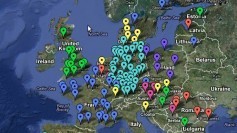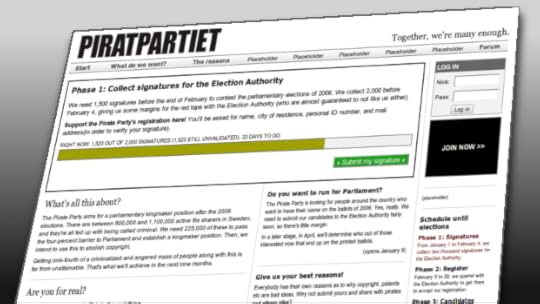Rick Falkvinge's Blog, page 41
June 15, 2012
ACTA Battle: Send Mail To INTA Delegates!

Activism: The final vote on ACTA is approaching. Next week, the responsible committee in the European Parliament – International Trade (INTA) – votes on whether to recommend the destructive treaty for adoption or rejection as a whole.
We’re approaching the end-of-level boss fight here, and this is the final skirmish before that happens just around the corner. Lobbies and corporations are ramping up their efforts like crazy. Therefore, we need to provide a counterpoint right now and continuously up until the vote on the floor in the European Parliament in the July 3-5 session.
When you’re on the inside of Parliament, the only directly elected body in the European Union’s decision-making, you can feel this kind of citizens’ pressure very clearly. But you can feel the pressure from other decision-making bodies, too. The Commissioner trying to push ACTA through Parliament, Karel de Gucht, has invited himself to the INTA meeting in order to convince its delegates to vote in favor of ACTA. (This is remarkable in itself, and shows that the Commission regards the European Parliament as its would-be lapdog rather than a respectable body of representatives of 500 million people.)
This has happened so far in the ACTA showdown: Four advisory committees – Legal Affairs, Industry, Development, and Civil Liberties – have voted on what to recommend to INTA, which owns the main recommendation to the European Parliament. The four advisory committees all voted to recommend a rejection of ACTA. Next, INTA will settle on the European Parliament’s main overall recommendation, and then, the European Parliament decides in a final vote.
So, it’s time to mail the INTA members. Right now.
I have set up a mailing list at europarl-inta@falkvinge.net if you want to reach the INTA delegates easily. If you prefer to mail them one by one, a mailto link for all delegates is here.
Here is a sample letter – adjust to your liking, but keep it short and readable at a glance:
TITLE: Please reject the ACTA treaty in INTA
Dear MEP on the INTA committee,
As a citizen of [your country], I urge you to reject the ACTA treaty in the INTA vote. As we have already seen in advisory committes, the ACTA treaty is neither good from a Legal Affairs standpoint (JURI), is incompatible with fundamental rights in the Charter (LIBE), is contrary to third-world development (DEVE) as well as appearing contrary to the Digital Agenda to strengthen European IT industries (ITRE).
As for International Trade, you are no doubt aware of the assessment report where it’s clear in numbers that Europe does not gain from stronger copyright or patent protections; the EU27 is already at a net loss of 25 billion USD per year through these exclusive right constructs. Europe gains from weaker protection, not stronger: it cannot possibly be a policy goal by itself for Europe to increase the international trade deficit.
(Data from Directorate General for External Policies’ assessment report of ACTA, page 35.)
Finally, I wish to respectfully remind you that the citizens of Europe remain upset about and vigilant against this treaty, with protests against ACTA being held in over 100 European cities earlier in June, following up on similar earlier protests that were equally Europe-wide.
Accordingly, I urge you to vote in INTA to recommend the European Parliament to withhold its consent to the ACTA treaty.
Sincerely,
[your name]
[your country]
INTA is scheduled to vote on ACTA at about 10:00 on June 21, but this can and will change without notice. After that, the European Parliament as a whole adopts or rejects the treaty some time July 3-5. As I’ve written in a previous article, if ACTA is rejected by the European Parliament, it dies globally.
This is the last leg of the marathon. It ain’t over till the fat lady sings.

June 14, 2012
Commissioner Kroes: “Heed The Pirate Parties, Or Lose Your Job”

Infopolicy: In an op-ed in Swedish newspaper Svenska Dagbladet today, Commissioner Neelie Kroes made an unprecedented statement: politicians in Europe need to understand that net liberty is important, and heed the Pirate Parties, or lose their jobs.
Commissioner Kroes is in Sweden for the EuroDIG conference, and took the opportunity to write an op-ed for one of the major Swedish newspapers. While she does what any politician must do according to protocol in this op-ed – namely, praise the host country’s unique abilities – she also says a few things that have never been seen in public at that level before.
Kroes… Commissioner WHO?
People in the European Commission, the highest administration of the European Union, are called Commissioners. It’s roughly the European-Union-level equivalent of a minister. Commissioner Neelie Kroes is responsible for the Digital Agenda.
In this op-ed, she writes, “The rise of the Pirate Parties has shown that net liberty is an important issue, one that our politicians must take seriously if they don’t want to lose their jobs.”
This is the exact message we’ve been sending for the past six years – I’m happy to see that it has now penetrated to the highest echelons.
Specifically, she writes in the op-ed,
The Internet has been an economic success, but on political levels, it has been less so. To the young generation, the fight for net liberty is what the green wave was for the 1968 generation and the baby boomers. The Arab Spring, the ACTA debate, and the rise of the Pirate Parties have shown that net liberty is an important issue, one that our politicians must approach with the utmost seriousness if they don’t want to lose power.
The parallel with the Green movement is also one that I have been hammering home for the past years.
It’s kind of interesting that she chooses a “power is important, so you should care about net liberty” approach, rather than “We’re Europe, we carry the legacy of the Enlightenment, so we care about freedom of speech no matter where it happens”. Still, this is the path that we calculated would work six years ago: attack and challenge the power, achieve and attain the civil liberties.
Unfortunately, after having had this published, reports tell me that she went on to speak at EuroDIG about how the existence of child porn necessitates limitations to freedoms of speech and net liberty (blah blah, yeah, we’ve heard it before and that doesn’t make it more true). When challenged with “the commission is just being paranoid”, Commissioner Kroes chose not to comment. Dear Commissioner Kroes — talking the talk is not enough; in a world where reputation is everything, you also need to walk the walk.
Hat tip to Jacob Hallén.

June 11, 2012
Humble Beginnings: The Very First Pirate Party Website

Pirate Parties: I found files in an old backup that I thought had been lost to history: the very first web site of the first Pirate Party.
Sometimes, reporters ask me if we have our very first party platform archived somewhere, for the reporters to read and compare to where the party is today. I’ve always responded with a sad “Alas, we edited the files live on the server at the time – it’s been lost to history at this point; we didn’t realize it would have historical value before it was too late.”
I’ve frequently told the story of how I put up a really ugly web page with a rough political platform on January 1, 2006, that signalled the start of the Pirate Party movement. But nobody has been able to see just how ugly the web page was, or how rough the edges of the first platform really were.
The first website of the Swedish Pirate Party. Now in English, too!
(The first platform and website was also reviewed in a some 700-plus comments on Slashdot, the Reddit-style sitekiller of its time. Copyright and patent monopoly discussions are mixed with laughter over the Swedish-language site, and even over Swedish language as such.)
So when I was looking for something completely different, I came across a Temp folder in my boneyard from mid-spring 2006 (I never delete anything, I just move it to a place called Boneyard), and realized these were the source files of the first Pirate Party website, files dated January 3, 2006… it was an archeological find. It was precious information that I thought was perished.
So I took the liberty of restoring those files to run on an Apache server, stripping out the back-end functions that was running against a Windows server at the time. I also translated the original site to English: Original Swedish site, translated English site.
Of course, these sites don’t aspire to be any kind of up-to-date representation of the Swedish Pirate Party; I have brought the site back online for historical reference at a different address than that of the party.
(Did you know that the first platform included policy that the then-minister of Justice, Thomas Bodström, shouldn’t be allowed to get any new public job beside selling hot dogs outside of Parliament? In the winter half of the year? Mr. Bodström was one of the engineers behind the Data Retention Directive, and had pushed it through the European Union behind the back of the Swedish parliament.)
This website was from a snapshot on January 3 – before we had the now-famous Black Sail logo. That logo didn’t come on stage until January 5, 2006.
There’s also a very clear lesson for entrepreneurs and activists here. This site was ugly as anything on launch, and yet, it has grown – no, detonated – into a worldwide activist movement gradually gaining entrance to parliaments. The saying “Perfect is the enemy of good enough” springs to mind.
Would it be interesting to hear of the early history of the Swedish Pirate Party in a series of articles?

June 7, 2012
Saturday, We Demand Our Freedom Of Speech And Rejection Of ACTA. We Can Win This.

Activism: This Saturday, on June 9, Europeans take to the streets again to drive a clear message home – telling the European Parliament to reject ACTA once and for all. The Internet has not forgotten, despite what lobbyists and corporate shills are hoping for. The Internet does not forget when corporations are trying to take away our freedom of speech.
As the citizens – the voters – we, the people – took to the streets this February and derailed the plans of just steamrolling ACTA into legislation, the politicians didn’t know what to do. The map of rallies back then, with February 11 as main rally day, was like nothing I’d seen. Nor, apparently, had the politicians and lobbies.
The corporate lobbies thought they could just get this passed uncontroversially, and it’s up to us to illustrate the controversy inherent in this abomination called ACTA, illustrate it to send the politicians a very clear message:
Selling our freedom of speech to a corporate bidder will always be controversial, and will risk costing you the thing you love most – your re-election.
Here’s Saturday’s rally map (all the rallies on the map are listed in text at the end of this article). I will be attending the Stockholm, Sweden rally. Which one is closest to you?
Make no mistake about it – this kind of continent-wide protest is felt deep into the halls of the European Parliament. This is an unmistakable rumbling earthquake that you notice as you stand still and listen for decision input. Frankly, this scares lobbyists. Also, it scares some politicians who thought corporations put them in office, and not voters. And it damn well should. Let’s send that message home this Saturday. All of us.
We demand our freedom of speech. We demand that corporations and lobbies do not get to determine what our net can be used for and not. We demand that politicians respect our fundamental rights and the net, or we’ll kick them out of office come re-election.
While the past votes in the European Parliament have gone our way, it is only due to us keeping up the pressure, and the margins have been slim. We need to show the world that we won’t give up the net and freedoms of speech without a fight.
Saturday, we win. Let’s make sure that this message echoes around the world: We will not be silenced!
List of rallies across Europe, per country
AUSTRIA
Graz, Mariahilferplatz, 13:00: Facebook event
Linz, 11:00, a rally bus from Postbusterminal to Hauptbahnhof, 15 EUR admission, see the Facebook event for details
Wien, Europaplatz/Christian-Broda-Platz, 14:00: Facebook event
BELGIUM
Brussels, Place de l’Albertine, 14:30: Facebook event
BULGARIA
Płowdiw, Пловдив площад Централен, 12:00: Facebook event
Sofia, Пилоните на НДК – София, 12:00: Facebook event
CROATIA
Rijeka, Ispred Konta (Titov trg), 16:00: Facebook event
CZECH REPUBLIC
České Budějovice, Náměstí Přemysla Otakara II, 14:00: Facebook event
Praha, Klárov, 15:00: Facebook event
DENMARK
Aalborg, J. F. Kennedys Plads, 15:00: Facebook event
Aarhus, Mølleparken, 15:00: Facebook event
København, Christiansborg Slotsplads, 15:00: Facebook event
Middelfart, Tæt på “Rock Under Broen”, 09:00: Facebook event
Nykøbing Falster, Torvet, 15:00: Facebook event
ESTONIA
Tartu, see Facebook event for location, 13:00: Facebook event
FINLAND
Helsinki, Asema-Aukio, 14:00: Facebook event
Jyväskylä, Kompassilla, 14:00: Facebook event
Lahti, Lahden kaupungitalo, 14:00: Facebook event
FRANCE
Bordeaux, Place de la Victoire, 14:30 or 15:00: Facebook event
Brest, Place de la Liberté, 14:00: Facebook event
Clermont-Ferrand, Place de Jaude, Statue desaix, 14:00: Facebook event
Dijon, Place de la Libération, 14:00: Facebook event
Grenoble, La Gare, 14:00: Facebook event
Lille, Porte de Paris, 14:00: Facebook event
Lyon, Place des Terreaux, 14:00: Facebook event
Marseille, Vieux Port, 14:00: Facebook event
Metz, (data missing)
Montpellier, Place de la Comédie, 14:00: Facebook event
Nantes, Place du Commerce, 14:00: Facebook event
Nice, Place Massena, 13:30: Facebook event
Nîmes, (public Facebook event broken – details missing)
Paris, Place d’Italie, 13:30: Facebook event
Pau, Place Clementceau, 14:00: Facebook event
Quimper, Place Terre au Duc Quimper, 11:00: Facebook event
Rennes, (gathering to join the Paris rally), Facebook event
Rouen, Place de la Cathédrale, 14:30: Facebook event
Saint-Malo, see Facebook event for details, 14:00: Facebook event
Strasbourg, Place Kléber, 14:00: Facebook event
Toulouse, Place Arnaud Bernard, 14:00: Facebook event
GERMANY
Aalen, Info booth from 0900, then taking the 13:35 train to the 15:00 Stuttgart rally: Facebook event
Augsburg, Rathausplatz, 14:00: Facebook event
Aurich, Auricher Rathaus, 12:00: Facebook event
Bamberg, (Facebook event broken – details unknown)
Berlin, Oberbaumbrücke, 12:00: Facebook event
Bonn, Kaiserplatz, 13:00: Facebook event
Braunschweig, Schlossplatz, 13:00: Facebook event
Bremen, Hauptbahnhof, 14:00: Facebook event
Bremerhaven, Hauptbahnhof, 14:00: Facebook event
Chemnitz, Marktplatz, 15:00: Facebook event
Dresden, Albertplatz, 13:30: Facebook event
Erfurt, Hauptbahnhof, 14:00: Facebook event
Essen, (data missing)
Flensburg, Hafenspitze, 16:00: Facebook event
Frankfurt am Main, Kaisersack am Hauptbahnhof, 14:30: Facebook event
Freiburg, Kartoffelmarkt, 15:00: Facebook event
Greifswald, Fischmarkt, 14:00: Facebook event
Hamburg, Rathaus, 14:00: Facebook event
Hannover, Klagesmarkt, 15:00: Facebook event
Hof, Am Strauß, 15:00: Facebook event
Heidelberg, Marktplatz, 17:00: Facebook event
Kempten, Forum Allgäu, 13:30: Facebook event
Karlsruhe, Marktplatz, 14:00: Facebook event
Kassel, Holländischer Platz, 15:00: Facebook event
Köln, Bahnhofsvorplatz, 14:00: Facebook event
Leer, Mühlenplatz, 13:00: Facebook event
Mannheim, see Facebook for location, 14:00: Facebook event
München, Karlsplatz/Stachus, 13:00: Facebook event
Münster, Servatiiplatz, 13:30: Facebook event
Neubrandenburg, Marktplatz Martstraße, 14:00: Facebook event
Nürnberg, see Facebook event for location & route, 15:00: Facebook event
Oldenburg, Bahnhofsplatz, 14:00: Facebook event
Ravensburg, Marienplatz Lederhaus, 15:00: Facebook event
Regensburg, Am Schwammerl im Park beim Busbahnhof Albertstraße, 14:00: Facebook event
Rostock, Universitätsplatz, 14:00: Facebook event
Saarbrücken, Schlossplatz, 15:00: Facebook event
Schwerin, Hauptbahnhof, 14:45: Facebook event
Stuttgart, Kleiner Schloßplatz, 15:00: Facebook event
Trier, Porta Nigra Platz, 13:00: Facebook event
Ulm, Münsterplatz, 15:00: Facebook event
Würzburg, Hauptbahnhof, 15:00: Facebook event
GREECE
Athens, Πλατεία Συντάγματος, 19:00: More info
Thessaloniki, Λευκό Πύργο, 19:00: More info
HUNGARY
Budapest, Lövőház utca, 17:00: Facebook event
Pécs, Búza tér (Vasarely tér), 17:00: Facebook event
IRELAND
(No rallies in this list. Please supply Ireland’s list of rallies in the comments, and I’ll update here.)
ITALY
(No rallies in this list. Please supply Italy’s list of rallies in the comments, and I’ll update here.)
LATVIA
Riga, Vērmanes Dārzs, 13:00: Facebook event
LITHUANIA
Vilnius, (data missing)
LUXEMBOURG
Luxembourg, Gare Centrale du Luxembourg, 14:00: Facebook event
NETHERLANDS
Rotterdam, Beursplein, 13:00: Facebook event
POLAND
Gdańsk, see Facebook event for place and time
Kraków, Bunkier Cafe, 15:00: Facebook event
Poznan, Stary Rynek, 17:00: Facebook event
Toruń, Pomnik Mikołaja Kopernika, 17:30: Facebook event
Szczecin, see Facebook event for place and time
Warsaw, see Facebook event for place and time
Wrocław, see Facebook event for place and time
PORTUGAL
Coimbra, Praça da República, 15:00: Facebook event
Lisboa, Café A Brasileira, 15:00: Facebook event
ROMANIA
Arad, see Facebook event for location, 18:00: Facebook event
Bucarest, Piata Universitatii, 18:00: Facebook event
Cluj Napoca, Piata Unirii, 18:00: Facebook event
Constanta, see Facebook event for location, 18:00: Facebook event
Timisoara, Orasul, 18:00: Facebook event
SERBIA
Beograd, Trg Republike, 18:00: Facebook event
SLOVAKIA
Banská Bystrica, Muzeum SNP – park pod Muzeom, 13:00: Facebook event
Bratislava, Námestie SNP, 15:00: Facebook event
SPAIN
(No rallies in this list. Please supply Spain’s list of rallies in the comments, and I’ll update here.)
SWEDEN
Göteborg, Götaplatsen, 14:00: Facebook event
Stockholm, Sergels Torg, 14:00: Facebook event
SWITZERLAND
Basel, (link to facebook event in public list is broken – please update in comments)
UNITED KINGDOM
Birmingham, Victoria Square, 12:00: Facebook event
Bournemouth, (public event broken – details missing)
Bristol, (public event broken – details missing)
Cardiff, Cathays Park, 12:00: Facebook event
Chelmsford, see Facebook event for location, 12:00: Facebook event
Glasgow, City Chambers, 13:30: Facebook event
Liverpool, (public event broken – details missing)
London, Europe House, 12:00: Facebook event
Manchester, Picadilly Gardens, 12:00: Facebook event
Map credits: The events were read off the Google map embedded above, maintained by Stopp-ACTA, retrieved Wednesday night/Thursday morning. (Please notify any updates you notice in the comments and to @Stopp_ACTA on Twitter. There is another Google Map listing another maintainer, but the two maps are identical down to having the same mistakes and spelling errors.)

June 4, 2012
Development Committee in European Parliament Also Rejects ACTA

Infopolicy: Today, the European Parliament’s last advisory committee had its say on ACTA – the Development Committee, overseeing third world development and world health issues. It joined its previous committees in recommending that the European Parliament rejects ACTA.
This was the fourth and last of the advisory committees that had a say in ACTA’s adoption. It turned the (horrible) draft around completely, and recommends the European Parliament to reject ACTA by a crushing vote of 19-3. The Development Committe, DEVE, thus joins the previous three advisory committees of ITRE (Industry, Research, Energy), JURI (Legal Affairs), and LIBE (Civil Liberties) in recommending rejection. To see all of these areas of responsibility recommend a rejection of the controversial treaty will be a hard political nut to crack for the treaty’s proponents.
(UPDATE: The crucial 19-3 vote was recounted after being called into question. It remains certain that rejection was recommended by a crushing majority, but the numbers are not written in stone.)
The next thing that happens is that the committee that champions the issue of ACTA within the European Parliament, the International Trade committee (INTA), will summarize these opinions. It will then mix in its own, and give a final recommendation to the European Parliament.
INTA votes on its recommendation on June 20. The European Parliament votes some time in the July 2-5 session.
We’re winning, but only because we’re fighting. Just because we have a 4-0 lead, that doesn’t mean that this game is over until the fat lady sings along with the vote on the floor of the European Parliament.
See also ACTA-bloggen (in Swedish).

June 2, 2012
The Game of ACTA: Mid-Battle Analysis, Next Actions

Infopolicy: After the well-received ACTA rejection by the three first committes in the European Parliament, things are looking hopeful to prevent this middlemen-regime treaty from ever becoming reality. But we’re not there yet; here’s where we are.
The ACTA agreement, having been negotiated in secrecy for several years, have been deliberately kept from the eyes of the (voting) public during the negotiations. The idea is to create legislation through the back door, where only rich monopoly-defending corporations get a say, against the interests of the people – and particularly the poorest people, as ACTA deliberately conflates legally-made generic medication with counterfeit, potential fatal medication.
It’s even been so bad that corporations have received seats at the negotiation tables, but the public has been kept out. In some cases this has gone to absurd lengths – like when the Swedish copyright hawk Stefan Johansson, who led the EU ACTA negotiations during the Swedish EU presidency, deliberately tried to keep the governments of the United Kingdom and Italy in the dark about a “three strikes” scheme. (Stefan Johansson works in the Swedish Justice department, and allegedly also drafted the infamous Swedish IPRED law.)
Let’s look a little more in-depth on the ACTA game as a whole, as we approach the key showdown in the European Parliament.
Background
ACTA is being marketed as “TRIPs Plus”. Thus, to really understand ACTA, we must first look at the TRIPs agreement, as ACTA uses and builds on the definitions of TRIPs. If you don’t know the background to this agreement, it will probably sound like the worst conspiracy theory you ever heard.
With the decline of commercially viable industrial production in the United States in the mid-1970s, and specifically the successes of Toyota, a number of committees in the US set out to redefine global economy to keep the United States on top of the global economy, regardless of whether it produced anything. Through a series of events, this effort came to be spearheaded by Edmund Pratt, the then-CEO of Pfizer, leading the Advisory Committee on Trade Negotiations.
The effort was to redefine trade through a series of trade agreements portrayed as “free trade”, but factually lopsided the terms to make sure that the United States stayed on top. The idea was that if the United States can’t produce anything of value, perhaps it can rent out drawings and get finished products in return, and portray it as “free trade” to get away with it. Thus, copyright and patent monopolies would be the key to maintaining United States global economic dominance, rather than actually producing anything.
The group went to the UN WIPO, the United Nations body responsible for maintaining the Berne Convention, to create this scheme. (The United States joined the Berne Convention at this time for this purpose.) WIPO wouldn’t have any of it, and basically threw them out on the street. So instead, this group hijacked an existing body – the GATT, General Agreement on Tariffs and Trade – and proposed that TRIPs would replace its current governing agreement. That scheme worked, and GATT was renamed the WTO, World Trade Organization.
Thus, TRIPs is essentially the US copyright monopoly and patent monopoly holders – think Big Pharma, RIAA and Hollywood in collusion – getting their wet dreams masqueraded as “free trade” or “property”, which the US government supported, as this “free trade” means a rent revenue from the rest of the world (as of 2008, measuring 68 billion USD yearly).
The copyright and patent monopolies have absolutely nothing to do with morals, stealing, or property – it is an ongoing trade war, plain and simple.
(For those eager for details, I can recommend the book “Information Feudalism: Who Owns The Knowledge Economy?” by Peter Drahos and John Braithwaite, which is a bit heavy at times, but goes into excruciating detail about who did what and why to bring about the TRIPs agreement.)
ACTA is the followup to TRIPs. As such, it ratches up the lockdown of copyright and patent monopolies yet another notch to benefit the original creators of the TRIPs agreement, namely Hollywood, RIAA, Big Pharma, and the US Trade Representatives – at the expense of everybody else.
To take two tangible examples of how it does this, the agreement deliberately conflates counterfeiting and piracy, keeping on associating those words with one another as if “counterfeiting and piracy” was one term – meaning that it treats fake, fatal medication on the same terms as citizens sharing culture and knowledge, which makes no sense at all from a public-interest policy standpoint. It’s even worse, actually: it treats legally-manufactured generic medicine destined for the third world, manufactured in India and similar, as if it were counterfeit fake and fatal medicine. It makes no difference between medicines that are “legal to manufacture elsewhere but patent-monopolized here” and “counterfeit and dangerous to public health”. We’ll be returning to this as we petition the Europarl DEVE committee later in this article.
Global status and impact
ACTA is supposed by name to be a treaty against counterfeiting – and yet, none of the countries typically producing counterfeit goods are parties to the treaty. (This is actually no surprise, once you know the TRIPs strategy of gradually ratcheting up the bar multilaterally.) In any case, to be remotely effective, any treaty on monopolies (the copyright and patent monopolies) that aspire to be global must have at least two of the three world’s largest economies in it: The European Union, the United States, and China (listed in descending order of economy size).
All trade treaties depend on their enforceability, and this is typically done through trade sanctions (or, in rare example cases, with military means). The mechanisms of trade sanctions mean that larger economies can hurt smaller economies disproportionately – when the United States issues a trade embargo against Cuba, it is devastating to Cuba, but barely makes a scratch in the economy of the US. Thus, if the United States disagree with European Union policy, trade embargoes from the US will harm the United States just as hard as (or even slightly harder than) the European Union. As a result, the EU cannot be punished for not adhering to this treaty: trade sanctions won’t work.
Therefore, with the US pushing the agreement, and China not being part of the negotiations, it lives or dies with the acceptance of the European Union. It doesn’t really matter that Japan, Australia, and a couple of other smaller countries have signed it – if the European Union nixes it, it is effectively without force, having been designed to be a global treaty but failing to achieve that level.
Thus, the ACTA treaty as a whole lives or dies with the vote on the European Parliament’s floor on July 2-5.
Legal status in the EU
In the European Union, the ACTA treaty was introduced under so-called Nice rules (now replaced by Lisbon rules) as a mixed agreement. This means that the EU alone cannot decide on ACTA, but approval from the parliaments of all member states and the European Parliament is necessary for the treaty to be ratified in the European Union. Thus, we are – theoretically – looking at required approvals from 28 parliaments: the European Parliament and those of the 27 member states.
However, it is not quite that simple as one country being able to say no and get away with it, torpedoing the entire treaty. Eurocrats have already started investigating legal ways of circumventing national parliaments that are obstinate and refuse to approve this treaty just because it goes dramatically against their interests.
There appear to be several avenues to get around individual countries that insist on making democratic decisions, in particular since the Nice rules of operating in the EU were replaced by the Lisbon rules – essentially a new European Union Constitution. Which it was also originally called, when a few member states refused to approve it. As already noted, the Lisbon treaty is in effect now, despite that. That gives you an idea of what can happen to ACTA unless it is stopped on a broad front and in full force.
Yet other eurocrats are investigating the possibility of having ACTA take effect on the EU level only, ignoring the parts that the national parliaments would have a say about – which, under the Lisbon treaty, are essentially just some specifics of criminal sanctions.
Actions by national parliaments in Europe
This brings us to what has happened so far at the national level. The dominoes started to fall with Poland announcing that it put ratification “on hold” for the time being. Poland was followed by a number of other member states, but once Germany said the same thing, ACTA was effectively on hold. Poland and Germany together cannot be overruled; we’re talking a large enough fraction to make it politically impossible to steamroll over them by trickery.
The latest such action was from the Dutch parliament, which went one step further and requested the Dutch government not to sign ACTA, period, regardless of what other bodies think. However, this request has no effective binding force on the Dutch government – but what it does signal strongly is that the same parliament will refuse to vote to ratify ACTA, thus making it pointless for the Dutch government to proceed with the process. Parliament’s ratification is, as we have already seen, required for adoption.
(The Mexican senate pulled the exact same stunt about this time of last year, under the exact same conditions: effectively telling the administration that the Mexican Senate will refuse to ratify ACTA, so don’t bother signing it.)
However, as we have also seen, the Netherlands can and will be steamrolled over by eurocrats if they are the only ones holding up the worldwide adoption of ACTA, democracy be damned.
Ongoing political trickery
As always in the European Union, there is no shortage of politicians trying to win the battle by being better at political trickery, rather than being better at arguing your cause.
Marielle Gallo on the Legal Affairs committee (JURI) drew first blood in this regard, as she was appointed to champion the issue for JURI and write a draft opinion – she disallowed amendments to her report that essentially said “love and embrace ACTA”, forcing JURI to adopt or reject it as a whole. Normally, this would mean that she forced JURI into either having a positive opinion about ACTA, or no opinion at all. (It was rejected, and it had previously been agreed that a rejection should be interpreted as a recommendation to reject ACTA, in counter-trickery.)
Looking at the votes in LIBE (Civil liberties committee), there was a lot of similar trickery from the EPP party group, as they tried to disqualify amendment 42 from the voting process – an amendment to the LIBE opinion that added an outright recommendation to reject of ACTA. This didn’t work out the way EPP had intended, so in the end, the EPP party group abstained from voting in LIBE. (It remains to be seen how this abstention will affect the vote on the floor.)
Several amendments try to soften up the perception of ACTA by “calling for clarifications” by the European Commission and other bodies. This is one of the worst kinds of trickery – trying to give the impression that the meaning of ACTA can be altered, when it cannot. Unsurprisingly, these amendments also come from the proponents of the monopolistic treaty.
Finally, there have been tons of trickery in the process of writing the ACTA text itself. One such trick is the liberal use of the term fair process in the ACTA documents; this has no known legal meaning whatsoever. The legal term is due process. The room full of lawyers who wrote this text can impossibly be unaware of this, of course. Thus, even the ACTA text itself is written in bad faith and trickery.
Overall status
We appear to be winning, having net liberty and freedom of speech trump ACTA and corporate interests – but the margins have been narrow, harrowingly narrow, and continue to be so.
To give one tangible example, in the JURI (Legal Affairs) Committe vote on May 31, Marielle Gallo’s proposal for complete adoption was shot down by 12-10. (Yes, this is the same JURI that has previously had a 113% voter turnout when rejecting copyright reforms, and the same Marielle Gallo that authored the infamous and draconian Gallo Report.)
In this 12-10 vote, Christian Engström, Pirate Party MEP, voted on the winning side of net liberty. Put differently, were it not for the one single pirate on this committee, the JURI committee might not have had a majority for rejecting ACTA.
The same Christian Engström notes that in another European Parliament vote recently, a majority of the Europarliament appeared to vote in favor of ACTA. So the worst mistake we can make right now is to think that this is all over, that ACTA is dead. It is not.
Marielle Gallo asked to have her name removed from the losing ACTA report in JURI, by the way. That shows her lack of understanding of the Internet like nothing else – she will forever be associated with it, because the net doesn’t forget.
One promising nuance in particular is that the LIBE (Civil Liberties) committee opinion says that ACTA doesn’t appear to be compatible with fundamental civil rights in the European Union, essentially judging the treaty unconstitutional in the European Union. While this can still be ignored, it is done at quite a bit of political peril.
We appear to be winning, but only by a hair’s-breadth margin, and only because we are fighting hard to keep up the pressure on the European Parliament. In other words, you should send a mail to the next Europarl committee about to vote on ACTA, regardless of whether you live in Europe or not:
Next Steps
The immediate next step is the vote on Monday June 4 in the DEVE committee in the European Parliament, with notable responsibility for third-world development. The opinion on the table is horrible, and needs to be amended 180° or rejected outright.
Send a mail right now – it takes one minute and makes a real difference. One mail a minute is a voter shitstorm in the halls of the European Parliament, and we know very well that we are capable of much more than that.
Using this lookup tool, I have created a mailing list to the DEVE committee named europarl-deve@falkvinge.net that you can use to send a mail similar to this:
TITLE: Please reject the ACTA treaty
Dear MEP on the DEVE committee,
As a citizen of [your country/Europe/the world], I urge you to reject the ACTA treaty in the DEVE vote on June 4. The treaty deliberately conflates issues like counterfeit fatal medication with teenagers sharing culture and knowledge online, which are two entirely separate phenomena that should never have been allowed to be covered by the same piece of legislative text. Corporate lawyers like to conflate “counterfeiting and piracy”, but they are two completely separate issues that cannot and must not be treated with the same law.
Also, the treaty deliberately conflates generic medicine legally made in places like India – essential for third world countries – with counterfeit, potentially fatal, fake medicine. This is not only a blatantly false assumption, it also causes people who are the most in need of such generic, locally legal medicine to suffer and die completely unnecessarily.
Finally, the treaty also shuts the door for direly needed reform in these areas in the near future, and the European Parliament and national parliaments should have the ability to make necessary adjustments to key IPR concepts as we transition further into a digitally-framed economy where today’s loud middlemen add less and less real value.
Accordingly, I urge you to vote along lines that call for the treaty’s rejection by the European Parliament.
Sincerely,
[your name]
(If you prefer to send to the members of the DEVE committee individually, their individual addresses are here.)
Rallies on June 9
To finish up, it is absolutely vital that the June 9 rallies become on par with those held on February 11, for all the reasons outlined in this battle analysis. Some people have started thinking that the battle is won, or that the June 9 rallies could be repurposed to general net-liberty or feelgood rallies. That would be a foolish and possibly fatal mistake to do so at this point in the battle.
We need to keep the pressure up right up until the final vote in the European Parliament that happens some time July 2-5. If that vote is a rejection, and only then, have we won. This is not over until the fat lady sings.

June 1, 2012
If Filesharing is Theft, Then iTunes is Extortion

Don’t kid yourselves, artists, authors, and other creative people: charging money to access your work is morally reprehensible. You can argue semantics all you like, and call it “selling” to “customers” who “buy” your “product”. But the rest of us know that it’s nothing more than oppressive, tyrannical despotism.
Satirical Post
The views expressed in this article are intentionally absurd, and not intended to be taken at face value. I have to say this, because this is the Internet.
In the ancient world, a despotic king from a distant land might demand tribute from his conquered people in exchange for the “valuable” service of neither raping nor pillaging them. This is in contrast to the fact that normally, the conquered people would naturally have the right to live their lives rape-and-pillage-free. Similarly, when you publish a digitized cultural work on an online “store” such as iTunes or Amazon, you are demanding that people give you money in exchange for the “valuable” service of accessing a non-scarce, non-rivalrous, infinitely redistributable collection of data. These two scenarios — ancient and modern — are perfectly analogous, and are just as morally reprehensible as one another.
Therefore, it is in no way an embellishment to call a creative person who charges money for digital distribution a “despot”. You dirty, reprehensible despots, you. There is nothing hyperbolic about comparing a brutally violent relic of history to the modern-day idiosyncrasies of MP3s and stuff.
You despots have no regard for all of the hard-working people who made your creative output possible. If you’re an author, how could you write your novel if nobody ever invented the word “the”? Or the idea of paragraphs and sentences? Or the narrative and literary tropes which you used or self-consciously subverted (because you’re so postmodern)? You drew all of these things from the cultural commons, and the cultural commons is made up of everybody’s freely accessible, freely modifiable work. If everyone demanded ritual sacrifice of money in order to access and transform their work, then nobody would ever add anything to the commons ever again. What, do you want it all to just stop? Forever?
Now, given how undeniably right I am about all of this, you’ve probably realized that I’m a smart enough guy to be realistic. And I am. I’m extremely intelligent. I have unrestricted posting rights on the blog of one of Foreign Policy Magazine’s Top 100 Global Thinkers, so I’m obviously better than you.
Thus, I understand human nature. I’m not saying all of this to try and stop anyone from being evil, black-hearted despots who demand monetary tribute from innocent aficionados of culture. If a human being can ruthlessly extort money out of someone else, they will. That’s just common sense, and no amount of the ever-increasing biological and anthropological evidence to the contrary can change that. But don’t ask me to like it. Don’t ask me to be your friend if you demand money to read your book, watch your movie, listen to your music, or whatever it is you do.
Fortunately for basic human decency, I know that it’s a myth that demanding money for culture is a particularly easy process. For now, it’s a nontrivial exercise for people without access to conniving legal or PR teams. That’s why, despite the fact that most of the art and culture I enjoy is behind a paywall somewhere, I’ve still experienced a shitload of it with no obligation to pay. Most normal people (as opposed to petulant divas or pro-copyright lobbyists) can’t be bothered faffing around with self-aggrandizing whiny blog posts or suing their enthusiastic fans. They’d just like people to enjoy their work.
But the grand-scheme-of-things irrelevance of all of you malevolent, contemptible despots does absolutely nothing to quell my undying rage against you, which is not petty at all. I don’t care that your despotic demands for tribute have no discernible impact on anyone’s lives at the end of the day. If you charge money to access your creative output, then you are committing a crime against humanity.
You might say, why Zacqary, that’s a bold statement. To which I’d reply, no: it was an italic statement. This is a bold statement.
If you want to talk about cold, hard economic realities, let’s talk. But don’t try to argue semantics. Don’t try to gain the moral high ground. No matter what you say in a semantic or moral argument about these issues, you’ll always be wrong.

May 31, 2012
Three Strikes Against ACTA In European Parliament Today

Infopolicy: Three heavyweight committees in the European Parliament gave their voting recommendations on ACTA today. All three gave the same recommendation: reject ACTA. This means that today, the European Parliament issued three very hard strikes against ACTA.
What happened today was the first steps in a long chain that ends with the final vote in all of the European Parliament, which is the vote where ACTA ultimately lives or dies. If it is defeated on the floor of the European Parliament, then it’s a permakill. Boom, headshot.. But on the way to that vote, a number of specialized committees will say what they think from their perspective.
The committee that “owns” the issue of ACTA, the so-called INTA committee (International Trade), is the committee giving the final recommendation to the European Parliament as a whole. But as input to the INTA recommendation, four other committees will say what they think. Three of those – ITRE (Industry, Research, Energy), JURI (Legal affairs), and LIBE (Civil Liberties) – voted today.
They all voted to recommend rejection of ACTA, and therefore, effectively recommend that the European Parliament kill it dead. But this all happened with very narrow margins, defying an onslaught of procedural tricks and attempts of delaying, so the game is far from over.
Still, it is a sign of changing times. Rather than reciting amendments, political detailed minutiae and vote counts, I’d like to look at the bigger picture.
Perhaps the strongest indication of just how much times are changing is the fact that the monopoly maximalists – those politicians who are firmly planted in corporativist rule – have always had their way, especially in the committee of Legal Affairs which is full of lawyerspeak. At the same time, Pirate has been a dirty word, almost synonymous with criminal. Compare the first two votes today, in the Industry and Legal Affairs committees, and the Members of the European Parliament who were responsible for drafting the opinions of those committees:

Marielle Gallo. Born in the 1940s.
Classic and infamous copyright maximalist.
Opinion Defeated.

Amelia Andersdotter. Born in the 1980s. Representative for the Pirate Party.
Opinion Carried.
To see a Pirate Representative get her opinion (“reject ACTA”) voted through to the next step, whereas the copyright maximalist gets her opinion (“accept, embrace, and love ACTA”) shot down in the Legal Affairs committee, is a complete breach of a crucial tipping point.
The ACTA battle as a whole is far from over, though. The majorities were narrow. And the overall net liberty war, beyond ACTA, is definitely far from over. I just wanted to highlight how symbolic it is that leglislative text written by pirates is now carried.
Today, we had three important victories in individual skirmishes.
Next, the DEVE committee – (Third World) Development – votes on ACTA on June 4. The INTA committee’s vote, the final step before the main vote, happens on June 21. Then, the European Parliament as a whole votes early July – presumably 2nd, 3rd, 4th, or 5th.
We’re winning, but only because we’re fighting hard to win. This is not over.

May 30, 2012
Key Europarl Committees Vote On ACTA May 31 – Contact MEPs Now!

Activism: May 31, three key committees in the European Parliament will vote on ACTA. As of this writing, that is tomorrow – by the time you read this, it is less than 24 hours away.
The committees voting on ACTA tomorrow are ITRE (the committee for Industry and some more), LIBE (the committee for Civil Liberties) and JURI (the committee for Legal Affairs). These are three heavyweight committees that will give their input to the INTA committee (International Trade), which gives the final recommendation to the European Parliament as a whole for a vote later this summer. (Schedule here.)
It is time to make our voices heard – and it really does work.
La Quadrature du Net has a summary of what all the different recommendations and amendments mean, but it takes some time to get into.
Instead, I suggest that all of us send three mails, one to each committee. I have drafted the following format (adapt and rewrite to match your writing style as you like):
TITLE: Please reject the ACTA agreement [or something similar in your words]
Dear MEP on the [insert committee name here] committee,
As a citizen of [Europe/the world], I am gravely concerned about the Anti-Counterfeiting Trade Agreement, on which your committee will vote May 31.
This agreement, which has legislative effects but has been negotiated with corporate stakeholders outside of democratic transparency and accountability, appears to have severe curtailing effects on free speech online, as well as preventing the European Parliament and the parliaments of Member States from making very necessary future adjustments to key IPR concepts as we transition further into a digitally-framed economy.
Accordingly, I urge you to vote along lines that withhold the European Parliament’s consent to the ACTA agreement.
Sincerely,
[your name]
[your country, if in the European Union]
I have set up three distribution lists to make it easier for you to contact the Members of European Parliament on the respective committees in this urgent matter. They are europarl-itre@falkvinge.net, europarl-libe@falkvinge.net, and europarl-juri@falkvinge.net.
Please act. It takes but a minute.
ITRE votes at 10:00 Brussels time tomorrow, LIBE at 12:00, and JURI at 10:30. That’s how long we have to let them hear from us.
UPDATE: If you want to send to the MEPs individually rather than using the mail aliases above, the sendlists are here: ITRE, JURI, LIBE.
UPDATE 2: If you want to look up a subset of MEPs, like the Czech ones (as suggested in the comments), here’s the lookup tool I used to generate the mailing lists, run through Google Translate. It can not only filter by committee, but also by nationality of MEPs.

May 26, 2012
Hypothesis/Theory/Law: The Importance of Explaining Things Clearly

“First it’s a hypothesis, then it’s a theory, then it’s a law.” At first I wasn’t sure how such drivel ended up finding its way into grade school science classes, until I discovered actual scientists — with real Ph.D.s — seemingly corroborating it. That’s because they speak with the abstruseness of a credit card contract, hopelessly confusing everybody they attempt to educate.
As an example, a simple DuckDuckGo search (I’m a net activist; you think I’m gonna use Google?) for hypothesis theory law yields this About.com article written by — as I said — an actual scientist with an actual Ph.D. About.com isn’t a particularly reputable source for anything, but that doesn’t stop it (or “resources” like it) from being popular. Here’s what it has to say about the word “theory”:
A scientific theory summarizes a hypothesis or group of hypotheses that have been supported with repeated testing. A theory is valid as long as there is no evidence to dispute it. Therefore, theories can be disproven. Basically, if evidence accumulates to support a hypothesis, then the hypothesis can become accepted as a good explanation of a phenomenon. One definition of a theory is to say it’s an accepted hypothesis.
Wow, my brain started to hurt halfway through that paragraph. No wonder people have no idea what any of these words mean. And no wonder you hear anti-intellectual garbage like “that’s a theory, not a fact!” vomited all over the place.
And yet, we also have anti-intellectual garbage spewing from supposedly intellectual circles, such as the recent left-wing snarklejerk about how the US Congress is speaking at a lower grade level than it used to. We hardly need to resort to strawman arguments like this to say that Congress is full of idiots. After all, what’s inherently wrong with people who have less education being able to understand what the hell is being talked about?
Let’s look at an example of allowing lesser-educated people to understand what the hell you’re talking about. I’m going to try explaining what hypotheses, theories, and laws are:
A theory is a list of related laws*, which together explain a broader concept. A law is a statement which explains how a particular part of the universe works. For example, “every action has an equal and opposite reaction” is one of Newton’s laws of motion. Newton’s laws are part of the theory of classical mechanics.
Sometimes — such as in the theory of evolution — the laws contained in a theory are facts. Other times — such as in the theory of creation — the laws within are errors. Untruths. Wrong answers. Whether something is a theory or a law has no bearing on whether or not it is a fact.
If we’re not yet sure whether a law is a fact or an error, then that law is a hypothetical law. A theory composed entirely of hypothetical laws is a hypothetical theory. Anything that is hypothetical is also a hypothesis, much like how your douchebag boss is simultaneously a human being and a douchebag.
*Yes, there are also axioms and principles and blah blah blah, but we’re keeping it simple.
There. That’s much less likely to be egregiously misinterpreted, isn’t it?
Now, just so nobody egregiously misinterprets this article to be a tangent about science education that bizarrely found its way onto a political blog, I’m going to point out that this business about hypotheses, theories, and laws is just an example. In political discourse — especially political discourse about emerging technologies, futuristic scenarios, and recent social upheaval — you’re bound to encounter a lot of people who have no idea what you’re talking about. Your goal is to give them an idea of what you’re talking about.
The way you do that is to communicate clearly. There is no idea too complex to be explained comprehensibly, even to the densest of human beings. If your words aren’t understood, that’s your fault. If your words get misinterpreted, that’s your fault.
And when words are misunderstood or misinterpreted, it can have dire consequences.
I remember an incident in my first year of high school, when my History class was covering China. The teacher was discussing the geography of the region — specifically something regarding the Yellow Sea, off of China’s northeastern coast. The day before, we’d learned about the Yellow River; I found it curious that there were two bodies of water in the region named for the color yellow. So, I communicated this curiosity by asking, “Why is everything in China yellow?” That didn’t go over very well.
When people misinterpret a message, it can be as harmless as having all of your friends momentarily believe you to be a horrible racist. Other times, it can lead to mass murder in the name of a peace-promoting ideology. So please, for goodness’ sake, communicate clearly.

Rick Falkvinge's Blog
- Rick Falkvinge's profile
- 17 followers




